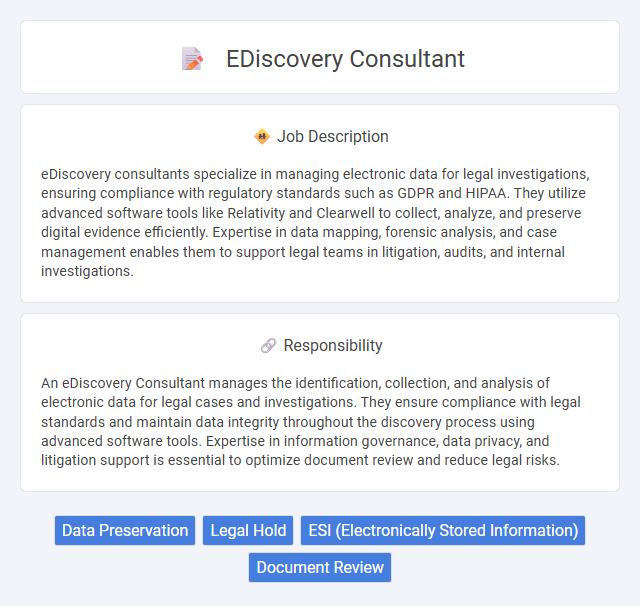
eDiscovery consultants specialize in managing electronic data for legal investigations, ensuring compliance with regulatory standards such as GDPR and HIPAA. They utilize advanced software tools like Relativity and Clearwell to collect, analyze, and preserve digital evidence efficiently. Expertise in data mapping, forensic analysis, and case management enables them to support legal teams in litigation, audits, and internal investigations.
Individuals with strong analytical skills and a detail-oriented mindset are likely to be well-suited for an eDiscovery Consultant role, as the job involves managing complex data and legal documentation. Candidates who thrive under pressure and possess excellent organizational abilities may find the conditions of this work environment conducive to their strengths. People who prefer routine tasks or lack interest in technology and legal processes might face challenges in adapting to the dynamic and demanding nature of eDiscovery consulting.
Qualification
An eDiscovery Consultant must possess in-depth knowledge of electronic discovery tools, data management, and legal compliance standards such as GDPR and HIPAA. Proficiency in software like Relativity, Clearwell, or Nuix and strong analytical skills to assess data relevance and reduce digital risk are essential. Relevant certifications, including Certified E-Discovery Specialist (CEDS) or Electronic Discovery Reference Model (EDRM) training, enhance expertise and credibility in managing complex litigation and regulatory investigations.
Responsibility
An eDiscovery Consultant manages the identification, collection, and analysis of electronic data for legal cases and investigations. They ensure compliance with legal standards and maintain data integrity throughout the discovery process using advanced software tools. Expertise in information governance, data privacy, and litigation support is essential to optimize document review and reduce legal risks.
Benefit
An eDiscovery Consultant likely enhances legal teams' efficiency by streamlining data collection, analysis, and review processes. This role probably reduces the risk of non-compliance with legal regulations, thereby minimizing potential penalties or litigation costs. Their expertise may also provide cost savings through optimized technology use and improved case strategy development.
Challenge
Navigating complex legal and technological landscapes is likely a central challenge for an eDiscovery consultant, requiring adept knowledge of data privacy laws and evolving software tools. The probability of encountering vast and unstructured data sets means that analytical skills and attention to detail are essential to efficiently identify relevant information. Meeting tight deadlines while ensuring compliance and accuracy may also put consistent pressure on consultants in this role.
Career Advancement
An eDiscovery Consultant leverages specialized expertise in electronic data collection, analysis, and legal compliance to support litigation processes, offering high demand across legal and corporate sectors. Career advancement opportunities include progressing to senior consultant roles, leading complex cases, or transitioning into project management and eDiscovery technology specialization. Developing skills in data analytics, legal technology, and regulatory knowledge significantly enhances promotion potential and salary growth in this evolving industry.
Key Terms
Data Preservation
eDiscovery Consultants specialize in data preservation strategies to ensure electronically stored information (ESI) remains unaltered and accessible for legal proceedings. They implement advanced data mapping and forensic imaging techniques to safeguard critical digital evidence across multiple platforms. Expertise in compliance with legal hold protocols and litigation readiness reduces risk of data spoliation and supports efficient discovery workflows.
Legal Hold
An eDiscovery Consultant specializing in Legal Hold manages the process of preserving electronically stored information (ESI) to ensure compliance with litigation or regulatory requirements. They implement Legal Hold policies, monitor custodian notifications, and track acknowledgement to prevent data spoliation. Expertise in relevant tools like Relativity, Clearwell, and Logikcull enhances the effectiveness of Legal Hold management and supports defensible data preservation strategies.
ESI (Electronically Stored Information)
An eDiscovery Consultant specializes in managing Electronically Stored Information (ESI) throughout the legal discovery process, ensuring accurate data identification, preservation, and collection to support litigation and compliance needs. Expertise in diverse ESI formats, advanced data filtering techniques, and legal hold protocols optimize the efficiency and integrity of digital evidence handling. Mastery of eDiscovery platforms and regulatory frameworks enhances risk mitigation and cost control in complex investigations and lawsuits.
Document Review
An eDiscovery Consultant specializing in document review ensures accurate identification, processing, and organization of electronic documents during litigation or investigation. Expertise in advanced review platforms like Relativity and Clearwell enables efficient categorization and relevance assessment, reducing legal costs and risks. Strong analytical skills support the extraction of critical evidence, complying with legal standards and data privacy regulations.
 kuljobs.com
kuljobs.com